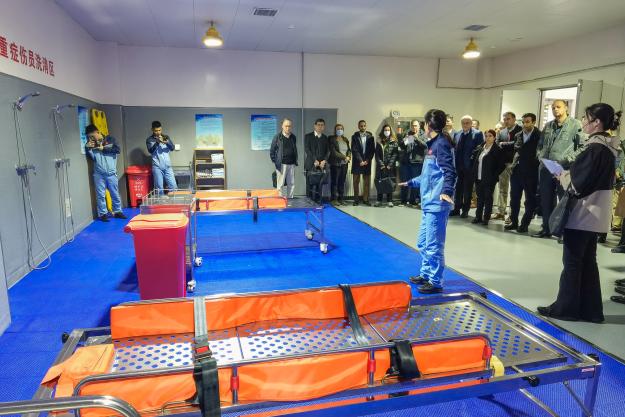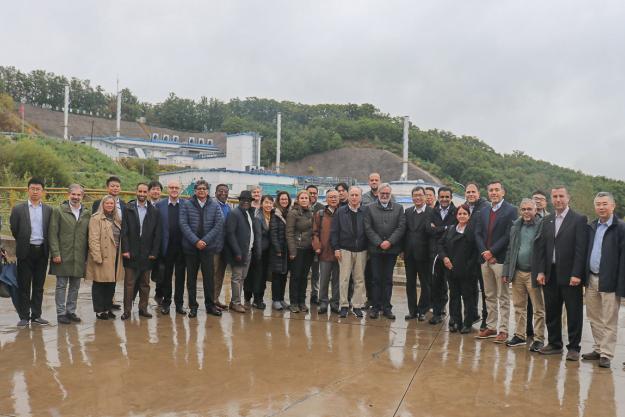Ambassadors Permanent Representatives to the Organisation for the Prohibition of Chemical Weapons (OPCW), including the Chairperson of the Executive Council, together with members and observers of the Executive Council, visited the People's Republic of China from 17 to 21 September to observe the progress in the destruction of chemical weapons abandoned by Japan on the territory of China. The Director-General of the OPCW, Ambassador Fernando Arias also participated in this visit.
The delegation, led by H.E. Ambassador Andrés Terán Parral, Chairperson of the OPCW Executive Council (EC) and Permanent Representative of the Republic of Ecuador to the OPCW, visited Mudanjiang Excavation and Recovery Sites, Heilongjiang Province and the Haerbaling Destruction Facility, Jilin Province, both located in north-east China.
The visit was attended by 21 participants from 15 States Parties, including 12 Ambassadors and Permanent Representatives to the OPCW, and by staff members the Technical Secretariat. This visit is the sixth visit by the EC to the ACWs sites in China, and the first physical tour of ACWs sites in China since the COVID-19 pandemic.
In his remarks during the visit, H.E. Ambassador Andrés Terán Parral stated: "The presence of high-level officials and various State representatives on this visit demonstrate the interest and commitment of the international community to the world disarmament programmes."

OPCW Executive Council receives briefing on the destruction of abandoned chemical weapons in China
The Chairperson of the EC acknowledged the commitment of both countries, China and Japan, to comply with the relevant provisions of the Chemical Weapons Convention (CWC) and with the plan adopted by the EC. He said "These in-site visits provided the members of the EC and observers with relevant first-hand details, information and figures that will be useful to eventually elaborate a report that will contribute to the advancement of the programme for the elimination of ACWs."
He further underscored the EC's commitment to this matter and to provide China and Japan with the necessary support for their ongoing efforts, so as to facilitate the expedited destruction of chemical weapons abandoned by Japan on the territory of China.
During the on-site visits, Director-General Arias underlined that truly achieving a world free of chemical weapons requires ensuring the safe, secure, and complete destruction of old and abandoned chemical weapons. He commended the progress on the destruction of ACWs in China, noting "over 127,000 ACWs items abandoned by Japan on the territory of China had been declared, and more than 105,000 items have thus far been verifiably destroyed".
Director-General Arias underscored the importance of the inspections by OPCW to monitor and verify declarations of recovered ACWs and destruction activities, stating that since recovery and destruction operations began, the OPCW has conducted a total of 168 ACWs inspections in China. "These inspections are key in providing assurances to all States Parties regarding the full and effective implementation of the Convention's provisions on ACWs," he added.
The Director-General also highlighted the key role that the trilateral consultations between China, Japan, and the Secretariat have played in coordinating the OPCW's verification efforts, saying "this platform has been instrumental in forging a constructive and results-oriented relationship based on cooperation and transparency, allowing for frank discussions when necessary."
During the visit, the participants received briefings by Chinese and Japanese government officials on destruction-related activities. A report will be circulated to the OPCW Executive Council that encapsulates its findings related to the progress of ACWs destruction. The OPCW Executive Council will consider the matter, including at its next session (EC-107), from 8-11 October 2024.

OPCW Executive Council at the Haerbaling destruction facilities in China
Background
The Chemical Weapons Convention provides a framework for facilitating destruction of ACWs. It stipulates that the Abandoning State Party is required to provide all necessary financial and technical means, as well as expertise, facilities and other resources, to destroy declared ACWs. The Territorial State Party shall provide an appropriate level of cooperation.
As the implementing organisation of the Chemical Weapons Convention, the OPCW is mandated to verify the destruction of ACWs as well as providing technical support as required. Following the OPCW Executive Council's approval of a destruction plan and timeline for destruction of these weapons, the OPCW verifies destruction operations through a combination of physical presence during on-site inspections, the use of monitoring and recording equipment and review of relevant documentation.
As the implementing body for the Convention, the OPCW, with its 193 Member States, oversees the global endeavour to permanently eliminate chemical weapons. Since the Convention's entry into force in 1997, it is the most successful disarmament treaty eliminating an entire class of weapons of mass destruction.
In 2023, the OPCW verified that all chemical weapons stockpiles declared by the 193 States Parties to the Chemical Weapons Convention since 1997 - totalling 72,304 metric tonnes of chemical agents- have been irreversibly destroyed under the OPCW's strict verification regime.
For its extensive efforts in eliminating chemical weapons, the OPCW received the 2013 Nobel Peace Prize.






